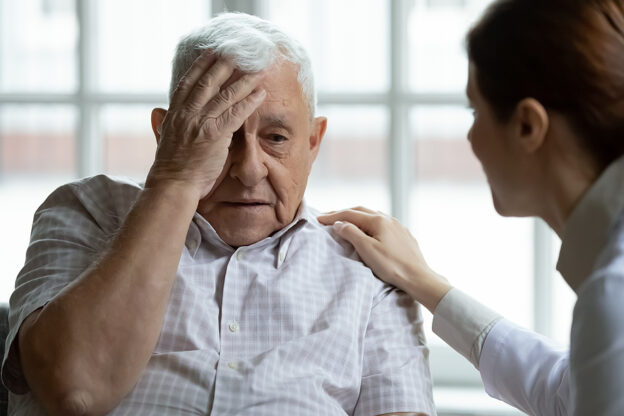By David Blyweiss, M.D., Advanced Natural Wellness
December 3, 2021
You’ve got a sharp ache in your lower back that you’ve never had before, so you head to the doc. He pokes and prods, then pats you on the arm and says, “You’re just getting older, so you can expect to start feeling more unusual aches and pains than you used to.”
Don’t you just want to punch him?
Just because you’re getting older, it doesn’t mean you’re stupid! You know there’s something wrong going on with your body, but you’ve just been dismissed like a little kid.
This is called ageism. It’s a form of prejudice or discrimination against older individuals. We see it often in healthcare, and I find it very disturbing. Seniors deserve much more respect than that.
We’ve all experienced it – whether in relation to our own health or that of our parents. I know I’ve heard many stories of ageism from my own patients.
Open your arteries, improve blood flow for a new health miracle...
Did you know your circulatory system has over 60,000 miles of arteries, veins and other blood vessels, if stretched end to end?
But as you age, your blood vessels undergo changes, which may cause them to stiffen, thicken and get clogged.
GOOD NEWS! Doctors have now identified a “Miracle Molecule” inside your arteries that helps OPEN your arteries and IMPROVE blood flow.
It’s what Dr. Valentin Fuster calls it, "One of the most important discoveries in the history of cardiovascular medicine."To you, that means...
- Healthy blood pressure
- Sharper mind and memory
- Skyrocketing energy and muscular strength
- Increased pleasure and passion in the bedroom
- Improved circulation to every cell and organ in your body
Go here to discover a new natural way to significantly boost the levels of this miracle molecule in YOUR body NOW!
- A 90-year dynamo is suddenly feeling fatigued and told, “When you get to be your age you can’t expect to have too much energy.”
- A 68 year-old with sudden-onset knee pain who hears, “At your age, you might want to think about scaling back your activities.”
- A healthy, active 71-year old who suffers appetite and weight loss is told, “It’s normal to have a decline in appetite when we get older.”
If someone had these kinds of health complaints 10 or 20 years ago, do you think the response would be something in the line of “Well what do you expect at your age, you’re not getting any younger!”
Of course not. A whole team of health professionals would jump into action to find out what the problem is and how to fix it. This is ageism in action.
The worst is when a patient on five, 12, 15 or more different meds explains to a doctor that the meds seem to be related to memory, balance or other problems. The doc gives the medication list a cursory glance and says, “Those were prescribed for a good reason. This kind of stuff just happens at your age.”
In the meantime, there’s something most people don’t know about the prescription drugs.
Older adults are often excluded from clinical trials for the very same medications used to treat our elderly population. What! The very people the meds are to be recommended for are not clinically trialed to look for safety and effectiveness? Consequently, physicians know very little about how a given treatment may affect their older patients, the most medicated group of people in our society.
Why is Ageism a Problem?
Many years ago I worked with a woman who was ageist. After a tragic medical event involving her 2 year old nephew, she wouldn’t see certain geriatric patients anymore. Her mindset had shifted in an odd way. If an elder patient continued to make the wrong diet/lifestyle choices resulting in the continuing of their chronic condition; whether pain or diabetes or a handful of other well researched cause and effect illnesses, well now they were just paying the price.
The World's Quickest Solution for Ending Prostate and Urinary Misery
This has recently been revealed to be one of the only real breakthroughs in prostate health.
The seeds of a strange fruit (sometimes called "Chinese Apples") hold powerful phytonutrients that are a revolution in prostate health.
In fact, UCLA and Veterans Administration research have now proved this to be true.
Not only that, but it may be the worlds quickest solution for ending prostate misery.
Simply stated, these phytonutrients represent a huge step beyond beta sitosterol, saw palmetto, and other phytosterols alone.
Simply click HERE if you want to have fast prostate relief...restful, uninterrupted sleep...no more constant "urges to go"...enhanced virility...and optimal prostate support for life.
But in the majority of cases, I don’t believe ageism is intentional. Most healthcare workers probably don’t even realize they’re doing it. Maybe it’s more of a stereotyping – unconscious thoughts or feelings about what it means to be elderly – that results in unintentional discrimination.
Now, not all doctors and healthcare workers are ageist. But the ones who are create a big problem.
Around one in five adults over 50 experiences ageism in healthcare. These are the ones who are more likely to be undertreated, thus less likely to seek further healthcare. And these are the same people who will develop new or worsening disabilities within the next few years.
In addition to blaming health complaints on old age, ageist healthcare workers may be less patient with elders or more likely to assume the patient is cognitively impaired or hearing impaired. So you often hear “elderspeak”. This is when your provider speaks to you very s-l-o-w-l-y or very LOUDLY. They might repeat themselves and use grade school vocabulary.
Even worse, when a third-party adult accompanies an older patient to an appointment, some doctors direct all questions and comments to the third party. It’s almost like the patient is a non-entity.
It’s patronizing and dismissive. It can make you feel unimportant and disposable.
But you’re not. You just need to find the right doctor.
Find the Right Doctor and Ask the Right Questions
Most medical schools have very few courses on geriatric medicine, even with America’s growing aging population. And while most schools offer specialty rotations in things like cardiology, surgery and pediatrics, very few offer geriatric rotations.
Your best bet is to find a functional medicine doctor like myself. We’re trained to widen our focus and take in every aspect of your health. This means we spend a lot of time talking to you. We dig deep to find the underlying cause of your problem… and actually fix it.
I treat the whole person. And my patients really appreciate it when they get the treatment they need so they can get on with living and stop worrying so much about their health.
You can easily find a functional physician in your area at the Institute for Functional Medicine.
Look for one who is an MD or DO, and make sure he or she is IFMCP certified. Call and talk to them before scheduling an appointment to make sure they understand aging and that they’re really practicing functional medicine… and not just “trying it out”.
No matter who you choose as your physician, make sure you are part of the discussion about your own healthcare.
- Insist that your doctor gives you as much time as you need. Don’t let yourself get rushed out the door.
- If you have someone with you, request the doctor speak directly to you, not your companion. You might be older, but you’re the one who is making the decisions.
- Don’t accept platitudes as solutions. If you feel this is the case, let the doctor know you want to be treated the same way as a younger patient.
- Bring a list of your questions and concerns. Make sure each and every one of them is addressed to your satisfaction.
Expect your doctor to treat you like a responsible adult, not a doddering old fool. If they don’t, go ahead and say it out loud. It might shock them into paying attention.
SOURCES:
The Importance of Age Diversity in Clinical Trials. Aug 2018. Applied Clinical Trials.
Bardach SH, Rowles GD. Geriatric Education in the Health Professions: Are We Making Progress?, The Gerontologist. 2012;52(5):607–618.
Rogers SE, Thrasher AD, Miao Y, Boscardin WJ, Smith AK. Discrimination in Healthcare Settings is Associated with Disability in Older Adults: Health and Retirement Study, 2008-2012. J Gen Intern Med. 2015;30(10):1413-1420.







